The World is Dependent on Drones Made by Just One Chinese Company - And That's a Problem (And More)
My latest for Foreign Policy, disaster feeds on Bluesky, and more.

What’s the Deal With All These Chinese Drones?
I’ve been watching the rise of China’s DJI consumer drone company for over a decade, ever since DJI launched the cheap drone epoch we’re living in today with the release of the original Phantom back in 2013. The Phantom was revolutionary, the first drone that pretty much anyone could use to shoot sweet footage of surfers - a device that launched an entire industry of drone service providers, and turned the Shenzen based company into, arguably, China’s closest answer to Apple.

At the same time, the United States and other countries have grown increasingly suspicious of DJI’s motives and loyalties, and lawmakers, like the odious Ron DeSantis in Florida, are rolling out new policies that crack down on the use of Chinese-made drones by government employees, from police officers to state university researchers.
Which might seem kinda reasonable, as compared to the other things DeSantis gets up to, except there’s one big, fat problem: there is no non-Chinese consumer drone company that does what DJI does. Much less does it at such a low price-point, which is a vital consideration for the vast swaths of modern drone users who don’t have unlimited cash to throw around.
And building a DJI-killer is a lot harder than you might assume: although a number of Western competitors tried to knock DJI off the pedestal over the last decade, they all failed. Partially, this was because DJI’s Shenzen location gives it direct access to the world’s biggest source of electronic parts manufacturing. Partially, a lot of those Western consumer drone companies made some really dumb decisions. Eventually, they largely stopped trying.
This is also why both Ukrainians and Russians are continuing to chew through vast quantities of DJI drones on the battlefield, despite massive misgivings about their reliance on Chinese tech. While Russian leaders may regularly claim that they’ll be coming out with a DJI replacement any day now, I’m not exactly holding my breath.
What’s more, our uncomfortable dependence on DJI creates a pretty enormous problem for civilian drone users in every country that doesn’t get along with China. If DJI drones were suddenly banned in one fell swoop in the US tomorrow, as some GOP lawmakers are calling for, then the civilian drone industry would be, to put it delicately, completely screwed.
I believe that it’s possible for the US and Europe to figure out how to build drones that can actually compete with DJI products, but it’s going to take some government support and changing up some of our existing priorities. Anyway, read the full Foreign Policy story here.
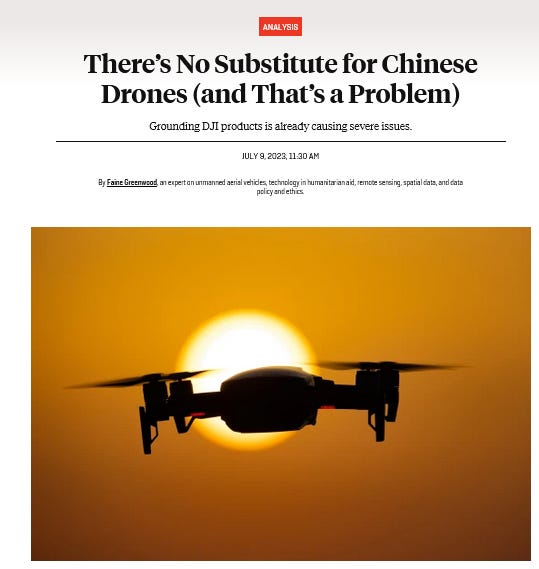
Threads Sucks and I Hate It
God, I despise Threads.
A corporate, non-chronological wasteland of all the dumb shit I hate about the Internet, set up in a way that ensures the user only has the most minimal amount of control over what they actually see. Privacy policies so overtly predatory that the entire grimy-ass application is banned (for now) in the European Union. Posters who are so totally bereft of humor that they’re incapable of recognizing an ancient Dril joke.
The list of grievances could go on, except I don’t want to look at the app again because I’m afraid that if I glance at it too many times, it’ll scan my retinas and figure out how to turn me into a deepfake wraith. Or something.
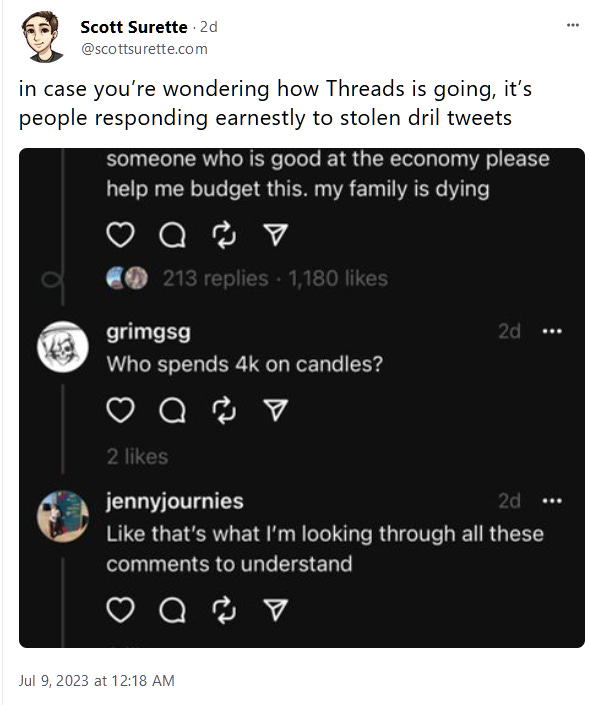
Threads sucks, and I was very worried, up until last Friday, that many of the people I care about following on social media would migrate over there anyway.
Like a lot of people, I was concerned that Meta would actively work to court journalists, news organizations, political figures and OSINT over to their platform. Such a mass migration would kneecap the growth of Bluesky before it could come out of beta, and would create a grim scenario that would make it much harder for people to stay the hell away from Meta-owned websites.
So in a way, I was relieved to find out that Threads doesn’t want their pristine social media feed of influencers with perfect, slightly-too-sharp teeth, Bernedoodles, and intimidating right-wing monsters (hi, LibsofTikTok!) to be befouled by actual information.
Threads chief Adam Mosseri - who ran Facebook’s News Feed back in 2016, and I think most of us remember how awesome that went - stated the other day that his service won’t be actively encouraging politics or hard news. Per Mosseri, these buzzkill, bummer topics aren’t “worth the scrutiny, negativity (let’s be honest), or integrity risks.”
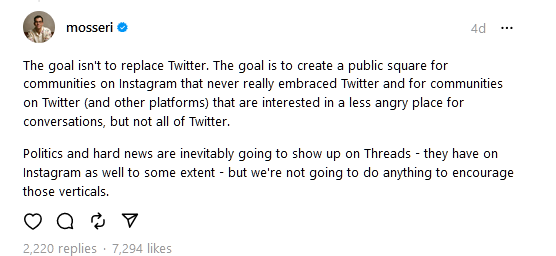
I’m working on an essay that will go into great detail as to why I despise Threads, Meta, Facebook, and Mark Zuckerberg and would rather eat my own kidneys than spend time on their platforms. It suffices to say that, for now, it sucks and I hate it.
And while I’m not surprised to see a lot of pundits and tech journalists slurping on Zuck’s feet for delivering them from the horrors of Elon Musk’s Twitter, I am, let us say, disappointed. Pay no attention to the genocide behind the curtain. (Sadly, a lot of people appear to have never heard about Facebook’s role in the Rohingya genocide in Myanmar, judging from the shocked responses I’m seeing on Bluesky when I talk about it).
I’m also disappointed - and worried - to see so many new Threads users saying that they feel like the platform is much safer and more friendly than Twitter is. Although Threads might be better than Elon’s Chock Full Of Nazis shithole for now, I don’t see many reasons to hope that it’ll stay that way.
While Blusky is at least attempting to give users interesting new tools to control what they see and who they talk to, Threads is doing nothing of the sort. In fact, as is traditional among mainstream social media companies, Threads appears to be poised and ready to let monstrous far-right extremists do pretty much whatever they want on their platform (even if it is ‘political’).
Out of fear that Tucker Carlson will yell at them. On Twitter.
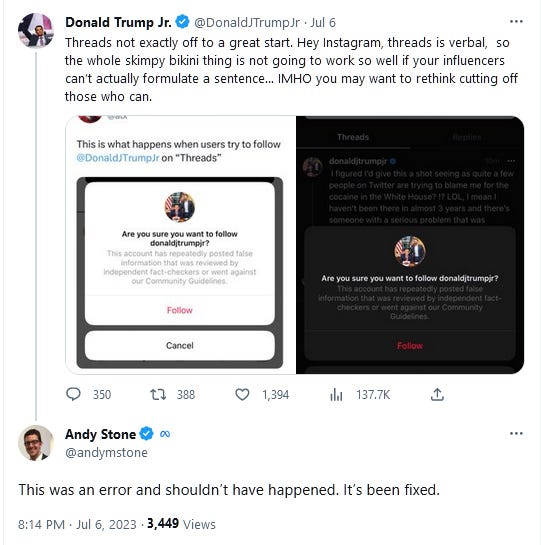
Disaster Social Media Is In Trouble, So I Made Some Bluesky Feeds About It
Disaster social media is in terrible peril right now.
Over the last 15 years, the world has constructed a pretty robust system of social media disaster communications, and Twitter, thanks to the way it’s designed, was the true jewel in the crown.
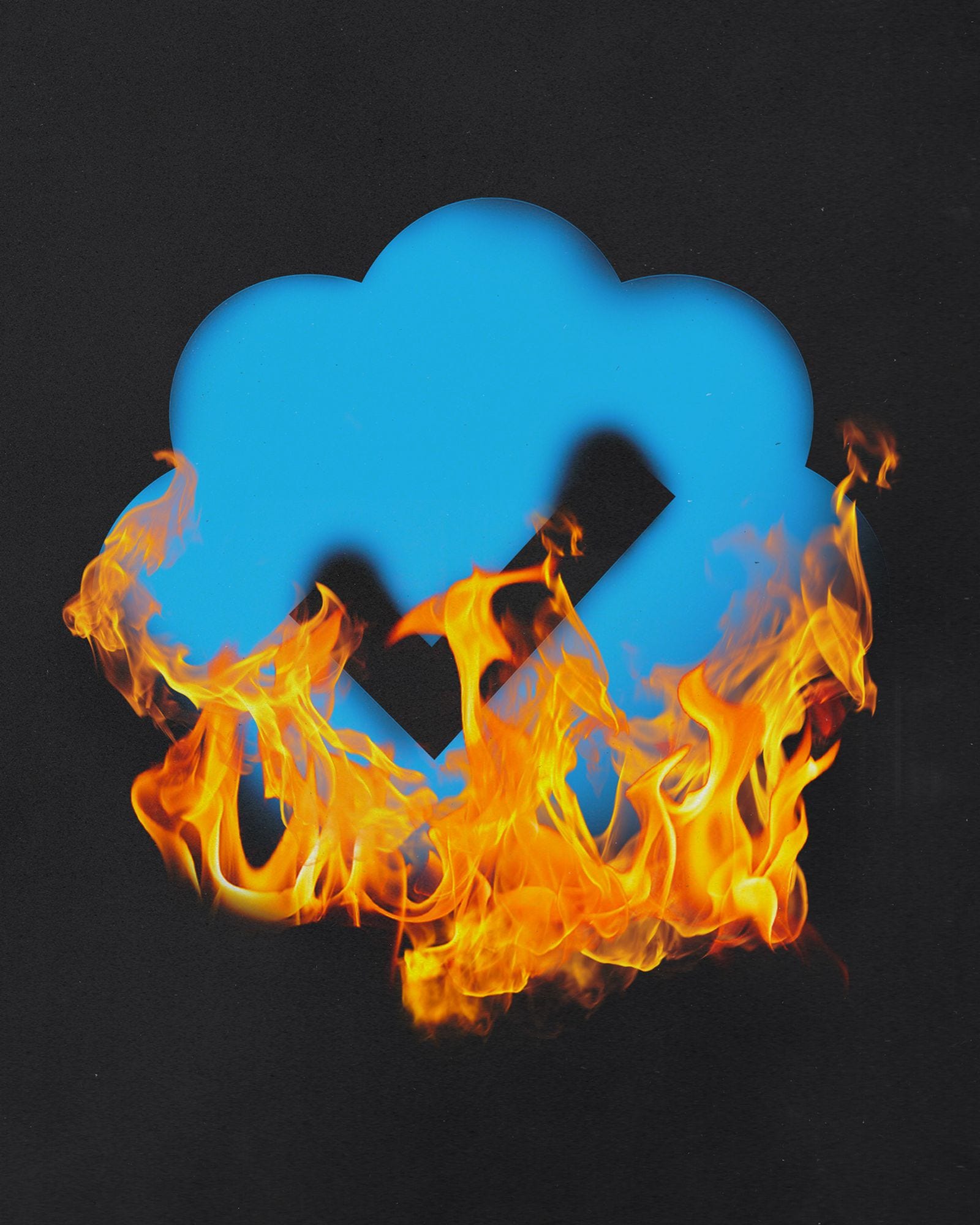
While the platform was always wildly imperfect for disaster responders, it was still much more open and easy to monitor than anywhere else. Around the world, people turned to Twitter as as key source of breaking disaster info, a site you could read without too much trouble without having to log in yourself.
You could use Twitter to detect earthquakes with surprising accuracy! Researchers found interesting ways to use Twitter to help reduce disaster risk! I relied on it myself to stay safe during the peak of the Covid pandemic!
And then came Elon, ever determined to flap around and shit on everything.

Twitter’s usefulness as a source of breaking news updates has declined immensely in recent months, brought down by everything from that recent rate-limiting nonsense to sky-rocketing chum-bot armies to janked-up trending topics. Users are fleeing Twitter, and with them, goes all that useful information that both people impacted by disaster and first responders used to depend on.
Unfortunately, none of the places all those users are fleeing to is anywhere near as effective for following disasters as pre-Elon Twitter used to be.
This is a dangerous situation. People have been relying on Twitter for life-saving information for years, and now one malignant billionaire has taken that away from them without adequate warning. The situation has been made even more dangerous by the continual gutting of local news media, a process that Facebook has played a vital hand in encouraging.
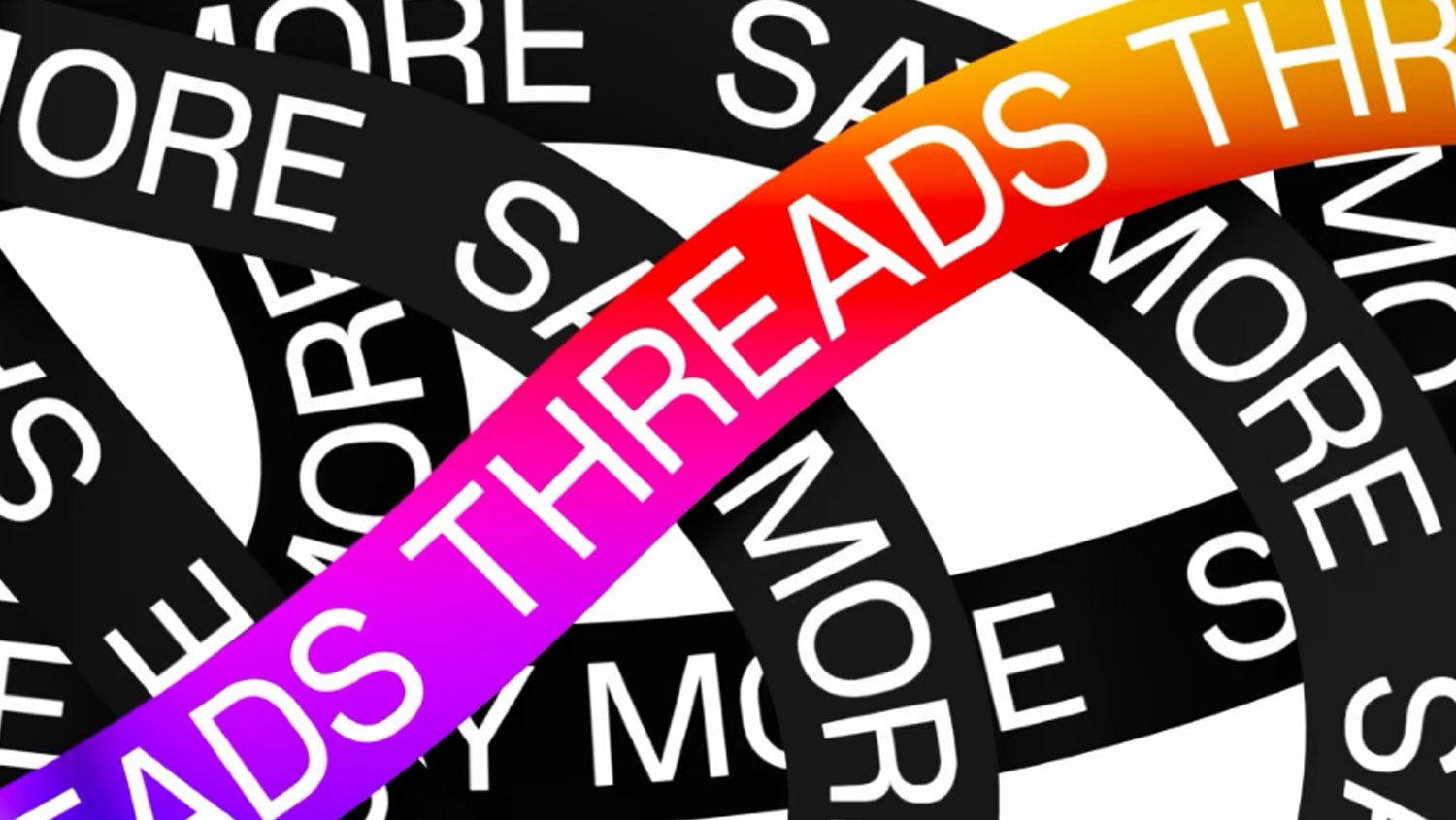
Threads is totally useless, constructed as it is as a constant firehose of inane influencer mewling. Supposedly, they’ll be introducing search terms and a chronological feed in the near future. But knowing Meta’s track record, I’d be stunned if these tools end up being useful. And as Mosseri reminds us, no bummers allowed on Threads! That means you, person trapped in their attic by ever-growing toxic floodwaters - show us a cute puppy or get the hell out! Of our website, I mean, not the attic.
Reddit is in the midst of its own usefulness Armageddon right now, with a CEO determined to, for some baffling reason, take cues on what to do from Elon Musk. And Reddit was always a somewhat more niche disaster response resource anyway. It’s certainly still a place I check for local news, but it never came close to Twitter’s scale and reach.
I don’t know what happens on Facebook around disasters in 2023, and I absolutely am not going to brave Zuckerberg’s soul-stealing log-in wall to find out. Sorry. But I’m assuming that since you need to log in to see anything, it’s not very helpful.
And then there’s Bluesky, the social media site where I spend most of my time nowadays. It is by no means a good disaster response and monitoring platform right now, what with being invite-only, and having a log-in wall up between the public and the posts. But I think that Bluesky has good ideas, foremost among them being that the site wants to make it very easy for users to set up their own custom feeds and algorithms.
As I caught up on the news about the horrendous flooding in New York and Vermont (where we just left from a family visit on Sunday), I realized that I ought to set up some disaster-focused Bluesky feeds.
While Bluesky doesn’t have a super-easy to use in-app feed building tool yet (that’s coming), the SkyFeed third-party Bluesky app does have a very handy feed builder tool that doesn’t require any messing around with code. All you’ve got to do is feed it a RegEx query with relevant terms - I use ChatGPT to help me generate mine, one of the few things it’s genuinely useful for - and then hit publish.
Below is a full list of my Bluesky disaster feeds so far, and here’s a Google Doc with URLs. They’re also available on GoodFeeds, an excellent directory website for Bluesky feeds that are, well, good.
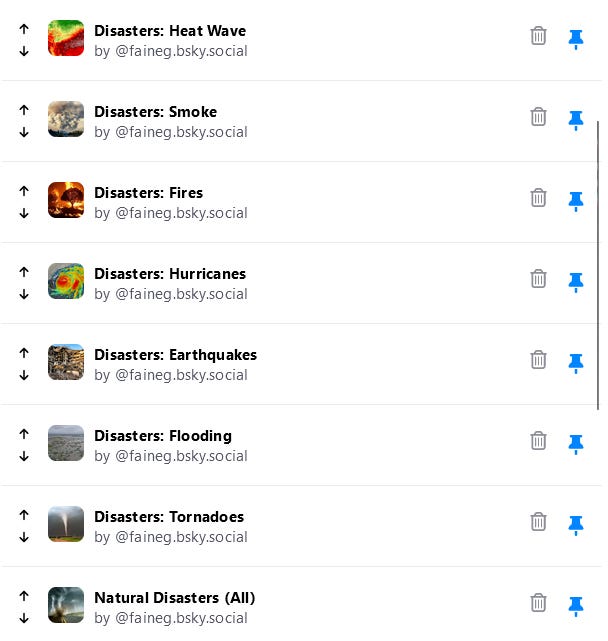
These feeds merely an early experiment in seeing how a future disaster-focused Bluesky might look, but I’m pleased with them thus far.
I get why Bluesky is taking their time to thoughtfully scale up, but in the meantime, disaster response social media is going to be in a very weird, confusing, and potentially dangerous place. Let’s try to do our best to keep each other informed in the mean time.
